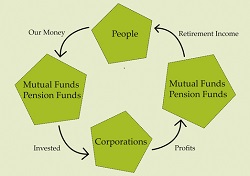|
People, Profits, & Pensions |
|
Kentucky Teachers & Western Union
Wednesday, February 12, 2014
The historic company began operating in 1851, as a telegraph company. As we all know, telegrams are ancient history, but Western Union reinvented itself a money transfer company, and has retained its place in the upper echelon of big business. Last year's revenue was $5.5 billion. In its fourth quarter and fiscal 2013 report, WU listed earnings at $1.43 per share and revenue decline of 2% (1% in constant currency). It also announced it would buy back up to $500 million worth of shares over the next 18 months. The Teachers' Retirement System of the State of Kentucky, informally known as the Kentucky Teachers' Retirement System, this pension fund represents more than 75,000 active members and 45,000 annuitants. It owned just under 400,000 shares of Western Union at the close of trading on December 31st. Almost 92% of Western Union's stock is owned by institutional investors, including mutual funds and pension funds like the Kentucky Teachers' Retirement System. The Bigger Picture:Will Profits from Big Macs Add to Your Retirement Income?In 1948, the McDonald brothers redesigned and remodelled their drive-in restaurant in San Bernardino, California. Taking inspiration from Henry Ford's assembly-line, they created the fast food revolution, with the quick service and low prices we now take for granted. In that same year, the U.S. National Labor Relations Board ruled unions could include pension issues in contract negotiations. That ignited a massive expansion of pension plans. In the 1950s, pension funds started buying stocks, rather than just bonds or their equivalents; in addition mutual funds came of age. With these two developments working, middle class people became owners of big business. At first, their stakes were modest, but steadily growing. And in just a few decades, they gained controlling interests in many large corporations through their funds. Management guru Peter Drucker has called it, "...one of the most startling power shifts in economic history." Now, working people reap the benefits of those investments, collecting much of the profit distributed by McDonald's and other big corporations. Discover how the pieces fit together. In Big Macs & Our Pensions: Who Gets McDonald's Profits? - a new booklet -(about 25-pages), you will:
You may not be among the owners of McDonald's. But if you belong to any pension plan, or contribute to a mutual fund or whole life insurance policy, you likely own pieces of some big corporations. More importantly, though, your retirement income will be bigger and grow more dependably than you would otherwise expect. Big Macs & Our Pensions: Who Gets McDonald's Profits? is now available at Amazon.com
|

The Ownership Cycle
Copyright 2014. Robert F. Abbott, All Rights
Reserved.
|

 By: Robert F. Abbott, author of
By: Robert F. Abbott, author of  Kentucky teachers, members of the
Kentucky teachers, members of the